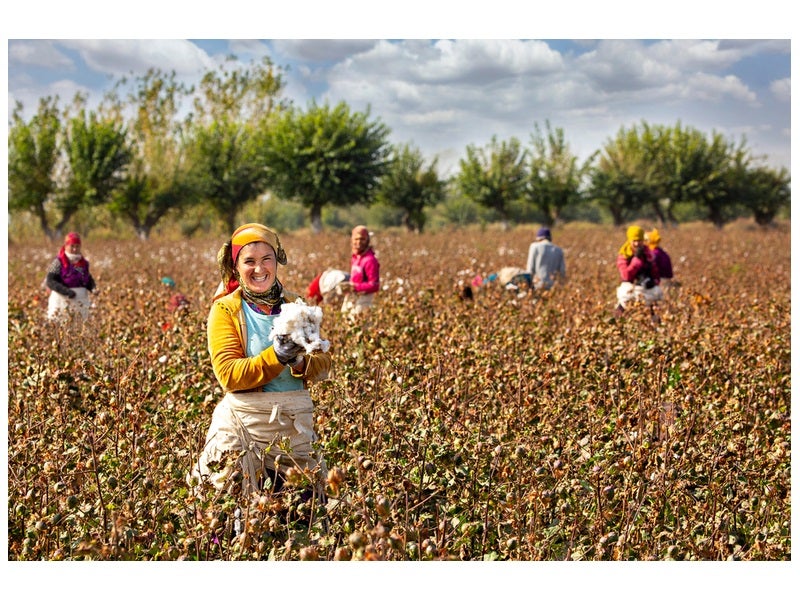
Preliminary findings of independent civil society monitoring of the 2022 cotton harvest published in Uzbek Forum’s Cotton Chronicle 2022: Observations Of Uzbekistan’s Cotton Harvest show that while political will to end forced labor remains strong, the progress achieved so far could be in jeopardy and reform must be reinforced.
The Cotton Campaign says human rights risks remain in the Uzbek cotton industry, including the risk of forced labour and exploitation of farmers.
The Cotton Campaign announced an end to its call for a global boycott of Uzbek cotton as the Uzbek Forum for Human Rights, a frontline partner of the Cotton Campaign published its report finding no central government-imposed forced labour in the 2021 harvest.
Uzbekistan’s textile sector is one of the country’s leading sources of employment. In textile production alone, nearly 7,000 enterprises employ more than 200,000 workers, whose incomes support the livelihood of 1m citizens.
In October, the US Department of Labor (DoL) awarded US$2m into supporting the improvement of labour conditions and to preventing forced and child labour in Uzbekistan’s cotton industry.
“This harvest, the first one since the Uzbek government effectively ended state-imposed forced labour, has shown that without worker-driven mechanisms to monitor and report labour rights violations, the reforms are at risk”, said Allison Gill, Forced Labor Program Director at Global Labor Justice-International Labor Rights Forum (GLJ-ILRF), which hosts the Cotton Campaign. “Freedom of association for workers and farmers is essential to develop and maintain a cotton industry that is free of forced and exploitative labour.”
The Cotton Campaign says the remaining risks underscore the “urgent need” for the industry and government to engage with civil society, farmers and workers, and their legitimate representatives, and establish robust mechanisms to prevent and mitigate rights violations at all stages of production. The establishment of these mechanisms is the only way to turn Uzbekistan into a key sourcing country for sustainable cotton and textiles.
Preliminary findings show that key high-level officials send consistent messages that local officials should not use forced labour or coercion. However, despite the abolition of the state order for cotton production, the government continues to exert strict control of the harvest and de facto production targets for individual districts persist. Uzbek Forum monitoring identified cases where pressure on district and regional government authorities to meet production targets has led to cases of forced labour in districts with insufficient voluntary labour. Furthermore, farmers are vulnerable to exploitation by cotton companies (known as “clusters”), with thousands of farmers reportedly being forced to sign blank contracts with no guaranteed minimum price, but often with inflated production targets.
“Following the lifting of the Cotton Pledge, global apparel brands are watching Uzbekistan and looking for signs of diminishing risks that would encourage them to begin sourcing from the country”, said Bennett Freeman, Cotton Campaign co-founder and former US Deputy Assistant Secretary of State for Democracy, Human Rights and Labor. “The Uzbek government and clusters should address the remaining gaps and demonstrate their commitment to international labour rights standards. Now is the time for reform to move forward, not backward.”
While several monitors suggest efforts to coerce people into going to the fields appeared to stop as soon as the information became public and that the authorities responded promptly, the Cotton Campaign says “ad hoc interventions are not enough to cement the progress made….and attract global brands and retailers to make investments in the long term in Uzbekistan.”
Conducting human rights due diligence at each stage of production “would be a real challenge” the body says.
“To encourage responsible sourcing of yarn and textiles from Uzbekistan, the Uzbek government and clusters must embrace the positive role civil society and workers themselves can play in ensuring labour rights are upheld,” said Raluca Dumitrescu, Coordinator of the Cotton Campaign. “This will give companies the assurances they seek that if they begin sourcing from Uzbekistan, they will not be violating national laws governing human rights due diligence, supply chains, and imports.”



